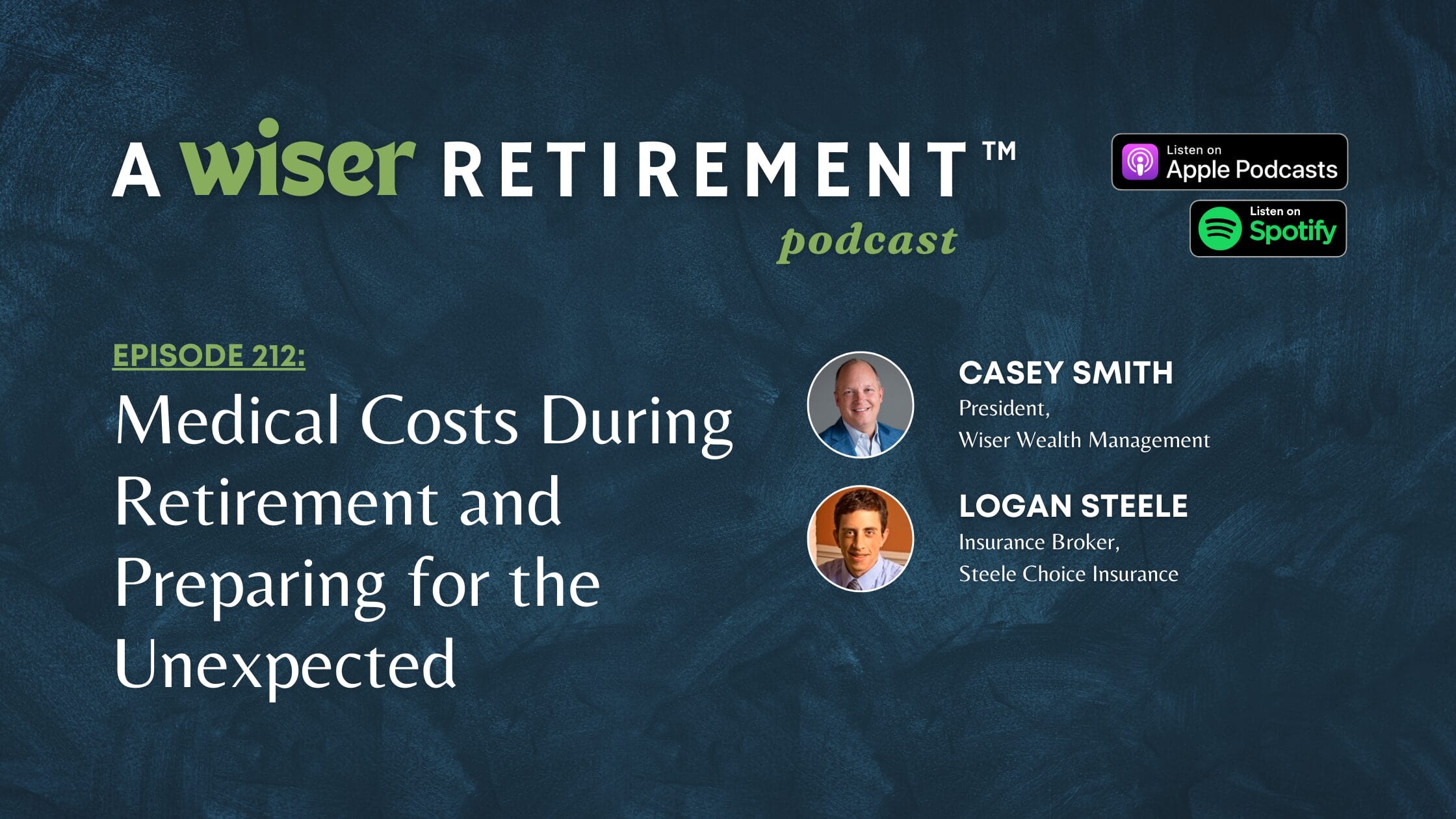
Medical Costs During Retirement and Preparing for the Unexpected
On this episode of A Wiser Retirement™, Casey Smith is joined by Logan Steele from Steele Choice Insurance to talk about medical costs during retirement and preparing for the unexpected. They go over Medicare, long-term care, healthcare costs, Medigap, and traveling overseas for medical procedures.
Listen or Watch:
Summary
Contrary to popular belief, Medicare is not a bad deal, and in fact, it often provides better coverage than corporate insurance. People may be concerned about losing their doctors or facing higher costs, but Medicare generally offers a higher level of coverage with lower deductibles and wider access to care. Medicare supplement plans, in particular, have zero networks, meaning that as long as a provider accepts Medicare, they will also accept the Medicare Supplement Plan. The cost of care on Medicare is also more manageable, with a $240 deductible under Medicare Part B. Overall, the transition to Medicare can be a positive one, with comprehensive coverage and affordable costs.
Healthcare Costs for a Couple Ages 65 through End of Life
The cost for medicare premiums, prescription drugs, and dental care was estimated to be $315,000 in 2023, but when long-term care is included, the cost doubles to $662,000. The speaker notes that about 70% of people aged 65 and above will require long-term care, and most do not have long-term care insurance. The cost of long-term care varies greatly between states, with Georgia having lower costs than Minnesota, where the cost for nursing home care is over $170,000 per year compared to $89,000 in Georgia. Assisted living costs an average of $4,300 per month in Georgia and $6,700 per month in Washington. It’s important to look into how the costs vary by state.
Long-Term Care Costs and Insurance
It is important to plan ahead for long-term care and medical costs in retirement, which can be significant and may not be fully covered by Medicare. Some states mandate long-term care insurance, but the costs keep increasing just before the mandate, leaving individuals to pay higher premiums. In states without mandates, the cost is lower. A long-term care policy can be utilized to protect assets and pass them on to the next generation. However, some individuals may choose to go without a policy and rely on state care instead. There is software that can help determine the difference between keeping the money invested versus pulling it out to pay for care. Be proactive and plan for medical expenses in retirement to ensure financial security.
Links:
- Learn more about Steele Choice Insurance.
- Click here to download one of our free guides that covers financial planning topics like retirement, investing, taxes, divorce, and more!
Connect:
- Click here to schedule a consultation with one of our financial advisors.
- Follow us on social media: Twitter, Instagram, Facebook, LinkedIn, and YouTube.
- Learn more about A Wiser Retirement™ podcast and access previous episodes.
Share This Story, Choose Your Platform!
Wiser Wealth Management, Inc (“Wiser Wealth”) is a registered investment adviser with the U.S. Securities and Exchange Commission (SEC). As a registered investment adviser, Wiser Wealth and its employees are subject to various rules, filings, and requirements. You can visit the SEC’s website here to obtain further information on our firm or investment adviser’s registration.
Wiser Wealth’s website provides general information regarding our business along with access to additional investment related information, various financial calculators, and external / third party links. Material presented on this website is believed to be from reliable sources and is meant for informational purposes only. Wiser Wealth does not endorse or accept responsibility for the content of any third-party website and is not affiliated with any third-party website or social media page. Wiser Wealth does not expressly or implicitly adopt or endorse any of the expressions, opinions or content posted by third party websites or on social media pages. While Wiser Wealth uses reasonable efforts to obtain information from sources it believes to be reliable, we make no representation that the information or opinions contained in our publications are accurate, reliable, or complete.
To the extent that you utilize any financial calculators or links in our website, you acknowledge and understand that the information provided to you should not be construed as personal investment advice from Wiser Wealth or any of its investment professionals. Advice provided by Wiser Wealth is given only within the context of our contractual agreement with the client. Wiser Wealth does not offer legal, accounting or tax advice. Consult your own attorney, accountant, and other professionals for these services.





